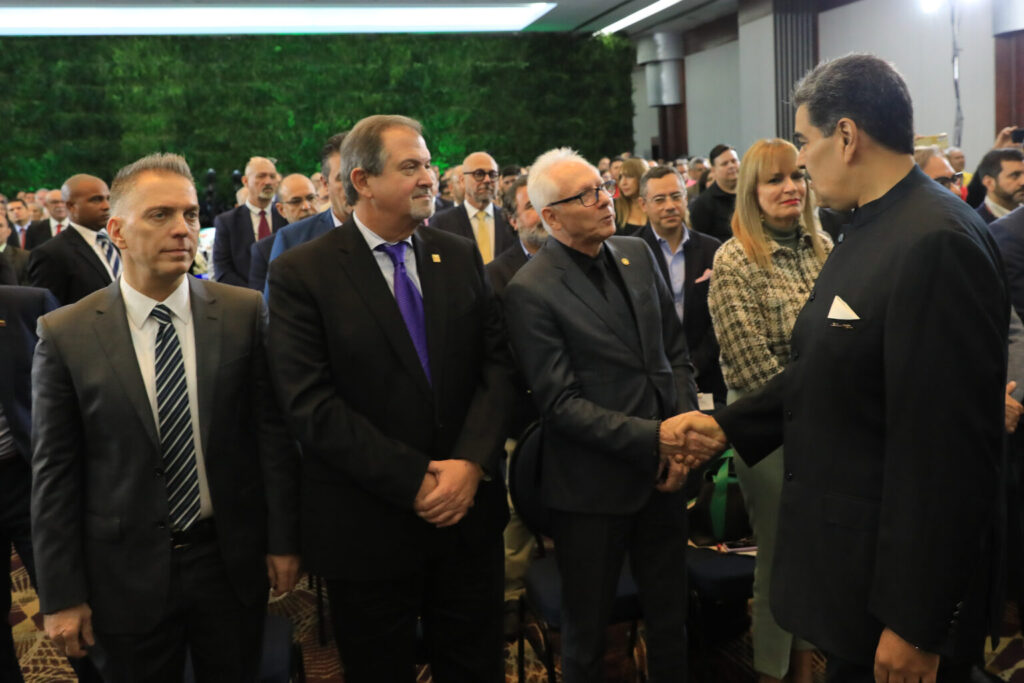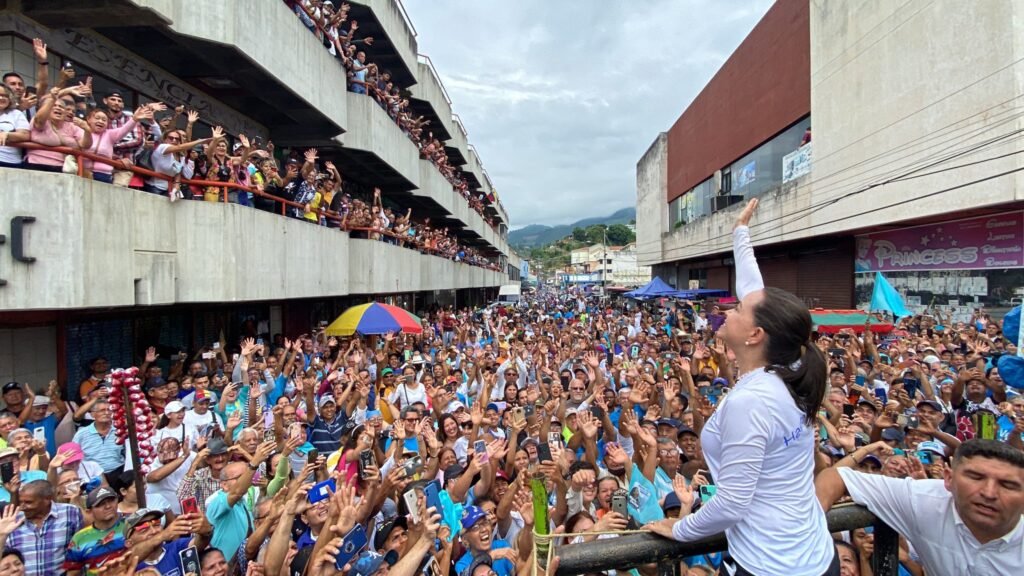Madurismo’s Electoral Dilemma
While the regime could contemplate a sham transition, led by another Chavista or a friendly “opposition” figure, Maduro is not willing to transfer the presidency. But a Nicaragua-like strategy could end up bursting its regime’s tensions


It is hard to believe that there is anything public in a government where everything belongs to one. – La Boétie.
Once the thesis that “the international community” would solve Venezuela’s internal problem failed, the traditional elitist/bureaucratic opposition (that we analyzed in a piece for CC) adopted a new one: that Madurismo (or the Madurato, if you will) could be displaced in an electoral process. In this case, something similar to an idealized version of the Chilean transition of the late 1980s, a kind of austral puntofijismo retold without the messy parts, the street battles and the ugly ultimatums. So, this thesis goes, the vote creates the freedoms and not the other way around. Go figure.
For the electoral route thesis, the Madurato thrives in violence and conflict. Thus, moderate Venezuelans have to stick merely to the electoral route and the negotiation tables, avoid provocations, believe in the power of the vote, wait and faithfully hope until the government –for some reason— will put itself in the position of losing the elections and give up power without a fuss. And yes, this is presented as a realistic expectation.
But there are two problems with this thesis. The first one is that Nicolás Maduro, not being an idiot, would never put himself in the position of losing the elections. The second one is that nothing forces him to do so. He is in a much stronger position than his adversaries and his government is ready to endure sanctions if the alternative is losing power. And it’s not certain that sanctions will return: despite the idealistic pro-democratic rhetoric of Western governments, there is interest in increasing the oil supply and to deal with the mass migration coming from Venezuela – be it in the Rio Grande or in Iceland.
But there is another problem with the aforementioned thesis. Maduro can’t win any election but he can’t eliminate elections either.
F for Fake
This dilemma is what defines the Madurato. Elections are wired in Chavismo as in the country: Hugo Chávez had the charisma of a rock star and the wealth of an Arabian prince and mickjaggered his victory over and over… But along came cancer and the drop of oil prices and Chavismo found itself stuck with a deeply unpopular leader.
After the parliamentary defeat in 2015, the suspension of electoral results worked for a while. But after the 2017 revolt that wasn’t enough and Maduro entered a new path: nor the mere fraud –as it probably was in 2013– but the falsification of the elections. And well-practiced falsification, as Orson Welles showed in F for Fake, becomes an art. It started with the Constituent Assembly of 2017, that falsified both elections and constituent power and continued with the sham election of 2018 in which there was no real choice, since the mainstream opposition boycotted and the game was rigged.
Venezuelan die-hard vote fetishists –that don’t know better than silly dilemmas as “voto o plomo”– continue to insist that electoral abstention is the main reason Maduro has such a tight grip on power and haven’t understood that the vote by itself became practically irrelevant since the 2018 sham elections, in which Henri Falcón and Javier Bertucci became the forerunners of what journalist Tony Frangie Mawad has called “transchavismo”: a non-formal extension of Madurista control or influence over Potemkin opposition parties and civil society organizations that have been historically part of the opposition.

The basis of this art is the ban on candidates, but it includes a repertoire of techniques including the expropriation of political parties, the manufacturing of candidates, the use of such candidates as tools and negotiating with traditional politicians that never wanted anything different than cohabitation and, of course, a piece of the cake. Thus, with broad spectrum dominance of the Madurato, the impotence of the opposition and a tendency of international normalization of the regime, everything should be tied up tightly… or not?
By following the logic of transchavismo (whose more elaborated product is not Benjamín Rausseo but Manuel Rosales) we could even speculate not only on a fake alternation –as the tyrant Juan Vicente Gómez did– or a one-party alternation as it used to happen in Mexico during the PRI years, or an irrelevant alternation as it happens in Iran. We can talk about a fake transition, in which the same “opposition” that declares its willingness to “swallow toads” and its abhorrence of struggle would defend a puppet government as independent as Luis Ratti and and as authentic as the Rausseo candidacy, while claiming that an actual transition is happening.
But, as beautifully evil as that would be, it will not happen. Maduro would not allow other members of the Chavista leadership to replace him. He has no flexibility, no capacity of delegation, no trust: it has to be him, in power, directly. Forever. Otherwise he has no confidence in not being purged by a successor, just like he purged Rafael Ramirez or Tareck El Aissami.
Maduro sure can just run a completely fake election and reelect himself like Daniel Ortega but, at what cost? There is no telling of what Venezuelans will do when they realize that they are condemned to six more years of an extremely unpopular Maduro. There is no way to know if even high ranking Chavistas or members of the Armed Force would defend that prospect.
And thus, a regime that even has a manufactured “opposition”, cannot even stabilize itself because it is tied to a leadership that is neither able to win elections or to delegate the presidency to someone that can. This is the Madurato’s tragedy: it fabricated transchavismo but can’t properly use that splendid artifice because of Madurismo’s inherent fragility – its power cannot be transferred, it has to be held. And the one in the top needs and wants to hold it forever.
The Machado variable
In an unexpected turn of events, 10 years after the demise of Chávez, María Corina Machado became some sort of political rockstar. In mass rallies in deep Venezuela, in places like Valera and Sabaneta where the disaster hits the hardest, she now proclaims that she’s going hasta el final. Common people are expressing through her both their rejection of the Madurato and to the traditional opposition political class, which includes some figures and parties that even tried to sabotage the primaries.

She has, of course, the merit of speaking of “building up force” while most of the politicians do not seem to be concerned about power relations. But that merit is overshadowed by the fact that she has a history of crazy and non-realistic “strategies” and of confusing people’s mobilization with mob violence and coup.
But, whatever her shortcomings, hers was kind of a victory of democracy given that it has hit hard both the weak cohabitational oppositions and the Madurato itself. Despite this, in Venezuela there is not a proper political democratic movement nowadays: just washed up parties that mean nothing and professional candidates wanting their piece of cake.
And there are still major challenges. Parties and civil society organizations lack coordination and are weakened, the judicial system is co-opted and Chavismo wants to impose a docile “opposition” candidate. Civil society is also frail after such a deep humanitarian crisis: with a third of the population abroad, and most of the rest in a hardcore struggle for survival, it is no wonder that Chavista repression is so effective. Rebellion became exodus and the common epic of the fight for our freedom became a myriad of personal epics of people looking for a future.
But in this juncture that does not mean that the Madurato has triumphed: in forcing himself into Venezuela, Maduro is putting everyone almost in a life or death situation, even for Chavismo, and the outcome of that tour de force is unpredictable.
Being an able autocrat, he opened the game with the Esequibo gambit, a fine tool to reshape, once more, the public sphere. But that doesn’t change the fact that, at some point in 2024, Venezuelans –including the Chavista and military elite– will understand that they have to live under Maduro for several more years. And the prolongation of the Madurato would be catastrophic for the whole continent. Thus, Venezuela –in what promises to be another annus horribilis– is in fact heading into the unknown.
Caracas Chronicles is 100% reader-supported.
We’ve been able to hang on for 22 years in one of the craziest media landscapes in the world. We’ve seen different media outlets in Venezuela (and abroad) closing shop, something we’re looking to avoid at all costs. Your collaboration goes a long way in helping us weather the storm.
Donate




